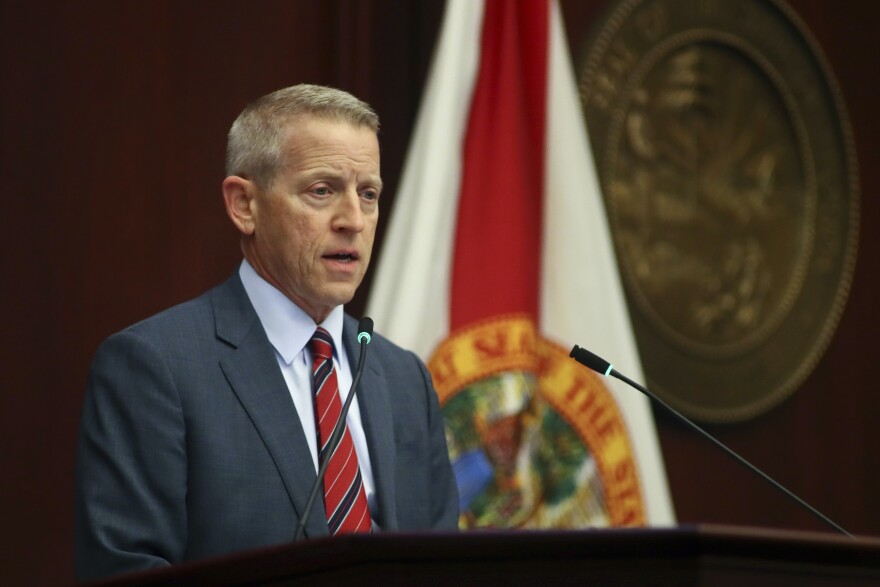A proposal that would massively expand eligibility for school vouchers began moving forward Thursday in the Florida House, with the Republican sponsor touting it as a way to provide “customized” education and Democrats questioning its lack of income requirements.
The House Choice & Innovation Subcommittee approved the bill (HB 1) in a 13-4 vote along almost-straight party lines, with Rep. Lisa Dunkley, D-Sunrise, the only Democrat who supported it. The bill, filed for the legislative session that will start March 7, is a major priority of House Speaker Paul Renner, R-Palm Coast, who called it a move toward “universal choice.”
The proposal would extend eligibility for vouchers to families of any student who is a “resident of this state and is eligible to enroll in kindergarten through grade 12 in a public school in this state.”
Florida’s voucher programs currently have income caps for recipients, and the proposed elimination of those limits drew questions from Rep. Angie Nixon, D-Jacksonville.
“Can you explain to me why you all struck out the income requirements?” Nixon asked.
House Choice & Innovation Chairwoman Kaylee Tuck, a Lake Placid Republican who is sponsoring the bill, pointed to an effort to make education customizable for everyone.
“The point of the bill is to expand eligibility for every student, regardless of background, regardless of income status. We want to make sure that every student has the opportunity to have a customized education,” Tuck replied.
The measure would essentially establish what are known as education savings accounts in Florida. Along with private-school tuition, money provided through the vouchers could be spent on things such as tutoring expenses, instructional materials, fees for various exams and “contracted services” provided by public schools.
Another part of the measure would allow home-schooled students to receive vouchers. Home-schooled student participation would be capped in the first year at 10,000 vouchers, with the number growing to 20,000 in the following year.
Nixon questioned Tuck about why the state should provide money to people who easily could afford such services.
“I just don’t think we should be subsidizing millionaires or billionaires,” Nixon said.
Nixon proposed a change to the bill that would have capped income eligibility at $1 million per household, but it was voted down by the Republican-dominated subcommittee.
Lawmakers changed the bill slightly Thursday to add two requirements. One would require scholarship funding organizations, which administer vouchers, to notify applicants that “participation in the program does not guarantee enrollment” in private schools. The other would make the state Department of Education responsible for informing districts about the number of students participating in the Family Empowerment Scholarship program, one of the state’s largest voucher programs.
While the bill would potentially lead to a substantial increase in the number of voucher recipients, it remains unclear how much money it would require. A House staff analysis of the measure said it would have an “indeterminate fiscal impact.”
Opponents of voucher programs have long argued that vouchers divert money from traditional public schools. Critics also said Thursday that participating private schools wouldn’t provide low-income recipients with adequate options.
“The choices that HB 1 provide will have negative consequences for the majority of families who choose voucher schools, because these schools do not provide quality, non-profit, non-religious, accredited choices for low-income families,” Scott Hottenstein, president of the Democratic Public Education Caucus of Florida.
It also remains unknown how many students would participate under the proposed expansion, but Tuck told reporters she doesn’t think it would lead to a “mass exodus” from public schools.
“I think it will be a modest impact. Honestly, I really don’t think we’re going to see the mass exodus (from) public schools that everybody is claiming. I really do think we have good public schools … and the bill is simply about providing parents choice, not taking away from public education,” Tuck said.
But Rep. Spencer Roach, R-North Fort Myers, pointed to many families potentially looking for other choices.
“This claim that the expansion of school choice is going to destroy public education, to me, that is an overt and explicit acknowledgement that thousands, perhaps tens of thousands, maybe hundreds of thousands of parents are going to choose to leave failing government schools in pursuit of a better option,” Roach said.




